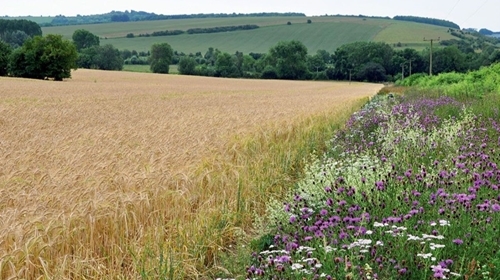Written by Henrietta Appleton, Policy Officer (England)

The year has been dominated by two policy eras – the last weeks of the Conservative government and the first few weeks of the new Labour one. But perhaps surprisingly the key messages during these eras have been broadly the same, focussing on water quality, ELMS and nature recovery.
And in some ways this continuity (with different emphases) has been welcome, as the uncertainties during the formulation of our domestic framework and trade arrangements were unhelpful, particularly for our farmers.
The new Secretary of State was quick to define his 5 key priorities – cleaning up rivers, a zero-waste economy, boosting food security, ensuring nature’s recovery and flooding. We have already written to the Defra team outlining how the research at the Allerton project can help deliver four of these priorities and inviting them to come and see these actions on the ground.
We have also spoken to Daniel Zeichner, the Minister for Food Security and Rural Affairs, about our guide on insect rich farmland habitat and the think piece Managing for More which outlines the evidence behind the need for predation management in nature recovery, particularly for red-listed fauna.
The messages we have been putting forward will be very familiar to members and supporters – not least because we know the measures we are proposing work! But we are acutely aware that a Labour government will have different emphases and it is these nuances that it will be important to understand. One of these nuances is likely to be increased statutory protections and requirements as indicated by the commitment to a new statutory plan to protect and restore the natural environment.
What the GWCT will be trying to encourage is a legal framework that is designed to be flexible and to respond to changes in our scientific understanding and emerging unintended consequences, and that the removal of any of the ‘tools’ currently used in conservation is supported by a risk assessment that considers not only the risk posed by that ‘tool’ but also the risk posed by its removal and whether there are practical alternatives readily available.
The removal of some pesticides comes to mind. Limiting the range of products available can have the unintended consequences of over-reliance (and therefore resilience) and more interventions with less effective, but possibly more damaging products. Farmers have resorted to sequential sprays of synthetic pyrethroids to control cabbage stem flea beetle (CSFB), which affects oilseed rape and kale.
Most populations of CSFB are resistant or partially resistant to the spray. Yet pyrethroids are very toxic to spiders – one of the key natural enemies of CSFB – as well as other terrestrial and aquatic insects. As they are usually sprayed in the autumn when there is much rain, the risk from run-off into water is high.
So whilst our core messages remain the same, we now have an opportunity to consider how these core messages might be considered by a new government. Values and beliefs are all part of politics and whilst the GWCT’s scientific evidence is second to none, we must not forget that political decision making is a process of co-production between policymakers, stakeholders and scientists.